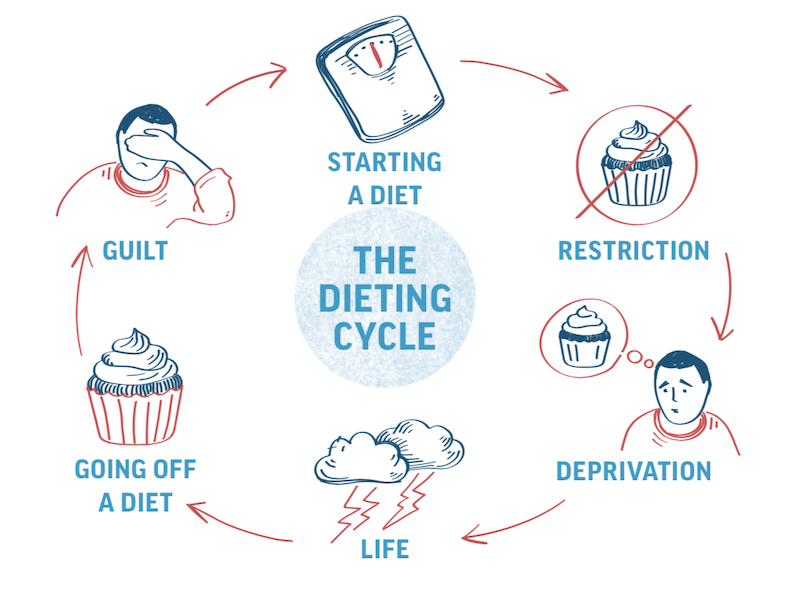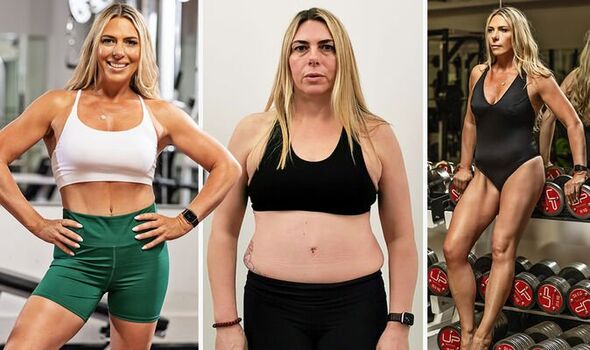Recognizing The Impact Of Menopause| My Personal Journey| Ending The Dieting Cycle| Prioritizing Health Over Weight Loss| Nourishing My Body| Listening To My Body| Embracing Movement| Cultivating Self-compassion| The Power Of Support| Get Adequate Sleep For Optimal Weight Loss|
Menopause encouraged me to give up dieting as counting calories and restricting portions didn’t address the weight gain associated with aging and lifestyle changes. Instead, I focused on healthy eating and exercise to manage weight gain during this transition.
Hormone therapy (HT) was not found to help with weight loss, and it is not indicated for that purpose. Additionally, HT does not prevent hair loss, stop wrinkles, or halt other signs of aging. Hence, giving up dieting and embracing a holistic approach became essential for effectively managing weight during menopause.
Recognizing The Impact Of Menopause
Menopause is a transformative phase in a woman’s life, signaling the end of her reproductive years. While many women are prepared for the physical and emotional changes that come with menopause, one aspect that often goes unnoticed is its impact on our relationship with food and dieting.

How Hormonal Changes Affect Women During Menopause
The hormonal changes that occur during menopause can have a significant impact on women’s bodies. Estrogen levels decrease, leading to a decrease in metabolism and an increase in fat storage, especially around the midsection. This hormonal imbalance can make it challenging for women to maintain their weight or lose additional pounds.
The Physical And Emotional Challenges Of Menopause
Menopause brings with it a range of physical and emotional challenges that can make dieting feel even more frustrating. Hot flashes, mood swings, and fatigue can make it difficult to stick to a strict diet and exercise routine. The fluctuation in hormones can also affect our mood, leading to emotional eating or cravings for comfort foods.
It’s essential to recognize that the changes happening in our bodies during menopause are natural and part of the aging process. Trying to fight against these changes by dieting and restricting ourselves can be counterproductive and harmful to our overall well-being.
Instead of viewing menopause as a barrier to weight loss or an obstacle to overcome, we can embrace this new chapter and shift our focus to finding balance and nourishment for our bodies. By adopting a more holistic approach to self-care and listening to our bodies’ needs, we can navigate through menopause with grace and self-compassion.
Let go of the dieting mindset and embrace intuitive eating, which encourages us to listen to our body’s cues for hunger and fullness. This approach allows us to make mindful food choices that nourish our bodies without the added stress of counting calories or strict meal plans.
Exercise should also be approached from a place of enjoyment and self-care rather than solely for weight loss purposes. Engaging in activities that we love, such as walking, dancing, or yoga, can help improve our mood, reduce stress, and support our overall well-being without the pressure of intense workouts.
In conclusion, menopause is a time to embrace and honor the changes happening within our bodies. Letting go of the dieting mindset and prioritizing self-care and self-acceptance can empower us to navigate through this phase with confidence and grace.
Powerful Strategies for Stronger Bones
The Dieting Struggle: My Personal Journey
During my personal journey, I discovered that menopause encouraged me to abandon dieting. Instead of counting calories and restricting portions, I focused on healthy eating and exercise for weight management. It’s important to recognize that menopause-related weight gain is often influenced by factors like aging, lifestyle, and genetics.

My Experience With Dieting Before Menopause
Before reaching menopause, I had tried countless diets in an attempt to achieve the ideal body weight. From low-carb to low-fat, I was constantly searching for the magical solution to shedding pounds and maintaining a slim figure. However, no matter how strictly I followed these diets, the results were often temporary and left me feeling frustrated and defeated.
The Impact Of Dieting On My Mental And Physical Well-being
The constant cycle of dieting had a significant impact on both my mental and physical well-being. Mentally, I found myself consumed by thoughts of food. Every meal became a source of anxiety as I meticulously calculated calories and obsessed over portion sizes. This mindset took a toll on my emotional health, leading to feelings of guilt and shame whenever I deviated from my prescribed meal plan.
Physically, dieting wreaked havoc on my body. The restricted food intake and constant calorie counting left me feeling fatigued and deprived of essential nutrients. I experienced frequent energy crashes and struggled to sustain my exercise routine. Furthermore, I noticed that my metabolism seemed to slow down with each new diet, making it increasingly difficult to lose weight and maintain it.
But it wasn’t only my mental and physical health that suffered; my relationships were also affected. Social gatherings became sources of stress, as I felt pressured to stick to my restrictive diet while others enjoyed delicious meals. I found myself isolating and withdrawing from social events, all in the name of staying on track with my weight loss goals.
It wasn’t until I reached menopause that I started to question the effectiveness and sustainability of these dieting practices. With hormonal changes and fluctuations impacting my body, I began to realize that my focus should shift from achieving a certain number on the scale to prioritizing overall health and well-being. Menopause served as a wake-up call that encouraged me to give up dieting and embrace a more intuitive approach to eating.
By letting go of the dieting mindset, I was able to forge a healthier relationship with food and my body. I started to listen to my body’s hunger and fullness cues, honoring its needs rather than strictly adhering to arbitrary rules and restrictions. This newfound freedom allowed me to truly enjoy meals without guilt or anxiety.
Additionally, I began incorporating regular physical activity that I genuinely enjoyed, rather than punishing myself with grueling workouts. This shift in mindset made exercise a source of joy and self-care rather than a purely weight-loss driven endeavor. I focused on moving my body in ways that felt good and nourishing, rather than solely for the purpose of burning calories.
As a result, I experienced an improvement in my mental and physical well-being. I felt more balanced, energized, and at peace with my body. My relationship with myself and others flourished as I was able to participate fully in social events and enjoy food without restrictions or guilt.
In conclusion, menopause encouraged me to reevaluate my approach to weight loss and ultimately allowed me to give up dieting. Through embracing intuitive eating and prioritizing overall well-being, I have found a sense of freedom and empowerment that surpasses any number on the scale.
Can Tiktok’s Navel Oiling Trend Melt Pounds & Soothe Stress?
Embracing A New Mindset: Ending The Dieting Cycle

Embracing a new mindset during menopause, I decided to break free from the dieting cycle. Instead of counting calories and restricting portions, I focused on healthy eating and regular exercise to manage weight gain. Letting go of dieting allowed me to prioritize overall wellness and embrace a more sustainable approach to weight management.
Understanding The Limitations Of Diets For Menopausal Women
When it comes to weight loss, diets have long been the go-to solution for many women. However, as menopause approaches, the effectiveness of these diets becomes questionable. Menopause brings about hormonal changes that can impact our metabolism and make weight loss more challenging. It’s important to understand the limitations of diets for menopausal women to avoid falling into the dieting cycle that often leads to frustration and disappointment.
During menopause, our bodies undergo significant changes, both physically and emotionally. Hormonal fluctuations can lead to weight gain, especially around the midsection. This weight gain is not solely due to hormonal changes but is also influenced by factors such as aging, lifestyle, and genetics. Therefore, solely relying on diets that focus on calorie restriction and portion control may not yield the desired results.
Research suggests that hormone therapy (HT) may help prevent menopausal weight gain, but it is not a guaranteed solution for weight loss. HT is not indicated for weight loss, and it’s essential not to rely solely on it to shed those extra pounds. Instead, it is crucial to adopt a holistic approach that takes into account the unique challenges faced by menopausal women.
Letting Go Of Societal Pressure And Unrealistic Expectations
Society places immense pressure on women to maintain a certain body shape and size. This pressure is amplified during menopause when our bodies naturally undergo transformation. It’s essential to let go of these societal expectations and embrace our bodies as they are.
By focusing on self-acceptance and self-care, we can free ourselves from the constant need to diet and fit into societal ideals. Menopause is a time of transition, and it’s crucial to focus on nourishing our bodies with healthy foods and engaging in physical activities that bring us joy rather than obsessing over numbers on the scale.
It’s important to remember that weight gain during menopause is a natural and common occurrence. Embracing this new phase of life means shifting our mindset from weight loss to overall well-being. By adopting a healthier lifestyle that includes balanced eating, regular exercise, and stress management techniques, we can support our bodies in navigating the menopausal journey with grace and acceptance.
Nourishing My Body: Prioritizing Health Over Weight Loss
Discover how navigating menopause inspired me to let go of restrictive diets and prioritize my overall health instead of focusing solely on weight loss. Explore the journey of self-care and finding balance in nourishing my body during this transformative time.
Adopting A Holistic Approach To Wellness During Menopause
During the menopause journey, I learned firsthand that weight loss is not the key to health and happiness. Instead of fixating on numbers on the scale, I decided to take a more holistic approach to wellness. This approach encompassed nourishing my body with nutrient-dense foods, prioritizing self-care, and embracing my body’s natural changes. By doing so, I not only found a sense of peace but also discovered a newfound vitality that I had been missing during my dieting days.
Focusing On Nourishing Foods Rather Than Restrictive Diets
One of the significant changes I made during menopause was shifting my focus from restrictive diets to nourishing foods. I realized that constantly depriving myself of certain foods only led to feelings of guilt and frustration. Instead, I decided to listen to my body and focus on nourishing it with foods that provided both physical and emotional satisfaction. Rather than adhering to strict meal plans or counting calories, I focused on incorporating a variety of whole, unprocessed foods into my diet. This meant enjoying a colorful array of fruits, vegetables, lean proteins, and healthy fats. These nutrient-dense foods not only boosted my overall health but also provided the essential vitamins and minerals that support hormone balance during menopause.
Embracing A More Balanced Lifestyle
Alongside nourishing foods, I also prioritized adopting a more balanced lifestyle. This meant finding a healthy balance between indulging in my favorite treats and focusing on nutrient-rich meals. Instead of viewing certain foods as “good” or “bad,” I embraced the concept of moderation and intuitive eating. To support my overall well-being, I also made time for regular physical activity that I genuinely enjoyed. Whether it was going for a walk in nature, practicing yoga, or dancing in my living room, I embraced movement as a way to not only maintain a healthy weight but also boost my mood and reduce symptoms of menopause.
Self-care As A Pillar Of Health
In addition to nourishing foods and physical activity, I recognized the importance of self-care during menopause. This included prioritizing restful sleep, managing stress levels, and finding activities that brought me joy and relaxation. I made it a point to engage in activities that supported my mental and emotional well-being, such as meditation, journaling, or spending quality time with loved ones. By adopting a holistic approach to wellness during menopause, I was able to prioritize my health over weight loss. I found that nourishing my body with whole, nutrient-dense foods, embracing a balanced lifestyle, and incorporating self-care practices not only improved my physical health but also created a positive mindset around my body and its natural changes. In the end, giving up dieting during menopause was one of the best decisions I ever made for my overall well-being.
Some Easy Ways to Lose Weight: Kickstart Your Weight Loss Journey Today
Listening To My Body: Tuning Into Hunger And Fullness Cues

During my menopause journey, I realized the importance of listening to my body’s hunger and fullness cues. This encouraged me to give up dieting and focus on nourishing myself without restrictions, resulting in a healthier and more fulfilling lifestyle.
The Importance Of Intuitive Eating During Menopause
During menopause, our bodies go through significant hormonal changes that can impact our metabolism, appetite, and weight. As a woman experiencing menopause, I’ve learned that dieting and restrictive eating simply doesn’t serve me anymore. Instead, I’ve embraced a more intuitive approach to eating, focusing on listening to my body’s hunger and fullness cues. Intuitive eating is a way of nourishing our bodies based on our own internal signals rather than external rules or guidelines. In this section, I want to share how tuning into my hunger and fullness cues has been crucial for my overall well-being during menopause.
Honoring Hunger And Learning To Stop When Full
One of the key principles of intuitive eating is tuning into our hunger signals and eating when we feel hungry. During menopause, our hormones can often leave us feeling hungry more frequently or experiencing shifts in appetite. Honoring these hunger cues is essential for maintaining balanced energy levels and preventing overeating or bingeing. Listening to my body’s hunger signals allowed me to ensure I was fueling myself adequately throughout the day, which in turn helped me maintain a steady energy level and avoid experiencing intense cravings or energy crashes. On the flip side, learning to stop when I felt comfortably full was just as important. Menopause can sometimes bring about changes in digestion and satiety, and it’s crucial to pay attention to these signals to avoid overeating. By tuning into my body’s fullness cues, I was able to better gauge how much food was enough to satisfy me without feeling uncomfortably stuffed. This practice helped me develop a healthier relationship with food, as I no longer felt the need to restrict or deprive myself, which often led to overeating or emotional eating. Incorporating mindful practices such as chewing slowly, putting my utensils down between bites, and paying attention to the flavors and textures of my food also helped me better connect with my body’s fullness cues. It allowed me to savor my meals, appreciate the nourishment I was providing myself, and prevent mindless overeating. Overall, listening to my body’s hunger and fullness cues has been a game-changer during menopause. It has allowed me to let go of dieting and restrictive eating, and instead focus on nourishing myself from a place of love and respect. By prioritizing intuitive eating, I’ve found greater enjoyment in my food, improved my relationship with my body, and achieved a more sustainable and balanced approach to healthy eating. Remember, your body knows what it needs, and by tuning in and honoring its cues, you can find empowerment and joy in your eating habits during menopause.
10 Morning Habits That Help You Lose Weight: Transform Your Body with These Simple Rituals
Embracing Movement: Finding Joy In Exercise
Exercise is a powerful tool when it comes to managing the symptoms of menopause. Regular physical activity can help alleviate common challenges such as weight gain, mood swings, and decreased energy levels. But it’s not just about the physical benefits; exercise can also be a source of joy and empowerment during this transformative stage of life. By discovering enjoyable forms of physical activity, you can create a sustainable exercise routine that keeps you motivated and uplifted.
The Role Of Exercise In Managing Menopausal Symptoms
Exercise plays a crucial role in managing menopausal symptoms and promoting overall well-being. During this stage, hormonal changes often lead to weight gain, which can be frustrating and challenging to navigate. However, engaging in regular exercise can help maintain a healthy weight and improve body composition. It’s not about adhering to strict diets or punishing workout regimens – it’s about finding movement that you genuinely enjoy.
Discovering Enjoyable Forms Of Physical Activity
When it comes to exercise, it’s essential to find activities that bring you joy and make you feel good. This could be anything from dancing and hiking to swimming or practicing yoga. The key is to experiment with different forms of physical activity and listen to your body’s cues. What activities make you feel energized, strong, and alive? What movements bring you a sense of joy and fulfillment? By exploring various exercise options, you can discover what resonates with you and make it an integral part of your lifestyle.
An approach to finding enjoyable physical activities during menopause:
- Try new activities: Explore different types of exercise, such as Pilates, Zumba, or cycling classes. Don’t be afraid to step out of your comfort zone and experiment with activities you’ve never tried before.
- Listen to your body: Pay attention to how your body responds to different movements. Does it feel invigorating or draining? Notice what activities make you feel good both physically and mentally.
- Find a workout buddy: Exercising with a friend can make the experience more enjoyable and motivating. It can also provide an opportunity for social connection and support during this transitionary period.
- Make it a habit: Consistency is key. Try to incorporate regular physical activity into your daily routine. Whether it’s a morning walk, an evening yoga session, or a weekend hike, make movement a non-negotiable part of your life.
Remember, embracing movement is about prioritizing your well-being and finding forms of exercise that light up your soul. By incorporating enjoyable physical activities into your lifestyle, you can navigate menopause with strength, resilience, and a renewed sense of joy.
Cultivating Self-compassion: Accepting And Loving My Changing Body
As menopause approached, I found myself on a perpetual quest to maintain my weight and adhere to societal body image ideals. Counting calories, restricting portions, and engaging in rigorous exercise routines became the norm in my life. However, as the transformative journey of menopause unfolded, I realized that my body was changing in ways that were beyond my control.

Letting Go Of Body Image Ideals And Embracing Self-acceptance
I came to the realization that holding onto rigid body image ideals was only causing me anxiety and discontent. The media and societal expectations had led me to believe that my worth was tied solely to my appearance, but menopause taught me that there is so much more to embrace and celebrate about myself.
Cultivating self-acceptance became an essential part of my journey. I learned to appreciate the resilience and strength of my body, which had carried me through various stages of life. Instead of focusing on external appearance, I shifted my attention towards nourishing my body with healthy choices and practicing self-care activities that brought me joy and fulfillment.
Practices For Cultivating Self-love And Body Positivity During Menopause
During menopause, I discovered several practices that helped me cultivate self-love and body positivity. These practices not only supported my well-being but also allowed me to navigate the changes in my body with grace and acceptance.
- Engaging in regular exercise: I shifted my perspective from exercise solely for weight control to exercise as a means of strength, vitality, and overall well-being. Activities such as yoga, walking, and dancing became my go-to choices, providing both physical and mental rejuvenation.
- Practicing self-compassion: I learned to be kinder and more gentle with myself, embracing the imperfections and the ups and downs of the menopausal journey. Instead of criticizing and berating myself, I became my own ally and supporter, offering words of love and encouragement.
- Surrounding myself with positive influences: I made a conscious effort to surround myself with individuals who celebrated and appreciated me for who I am, rather than focusing on superficial aspects. Building a community of supportive friends and loved ones helped me strengthen my self-esteem and reinforce the importance of self-acceptance.
- Focusing on self-care: I prioritized self-care activities that nourished my mind, body, and soul. This included practices such as meditation, journaling, indulging in hobbies, and treating myself to relaxing baths or massages. These moments of self-indulgence allowed me to reconnect with myself and honor the changes happening within my body.
By adopting these practices and prioritizing self-love, I was able to navigate the challenges of menopause with greater ease and acceptance. Cultivating self-compassion and embracing my changing body became the cornerstone of my menopausal journey. Instead of focusing on external appearances or trying to conform to society’s ideals, I learned to appreciate and love myself for all that I am.
The Power Of Support: Building A Community Of Women
Going through menopause can be a challenging and transformative time in a woman’s life. The physical and emotional changes that accompany this stage can often leave us feeling overwhelmed and uncertain. However, one of the most powerful resources to navigate this journey is the support and camaraderie of other women who are going through the same experiences. Finding a community of women who understand and empathize with the challenges of menopause can provide a safe space for sharing, learning, and healing.
Finding Support From Other Women Going Through Menopause
One of the first steps in building a community of women during menopause is finding others who are going through the same journey. Whether it’s through online forums, social media groups, or local support groups, connecting with women who understand the unique challenges of menopause can be incredibly empowering. These shared experiences allow us to feel validated and understood, knowing that we are not alone in our struggles.
Finding support from other women going through menopause
One of the first steps in building a community of women during menopause is finding others who are going through the same journey. Whether it’s through online forums, social media groups, or local support groups, connecting with women who understand the unique challenges of menopause can be incredibly empowering. These shared experiences allow us to feel validated and understood, knowing that we are not alone in our struggles.
Creating A Network Of Resources And Encouragement
Once we have connected with other women going through menopause, it’s important to create a network of resources and encouragement. This can include sharing articles, books, podcasts, and other educational materials that provide information and insights into menopause. Additionally, creating a space where women can offer support, encouragement, and practical tips can be invaluable. Whether it’s sharing advice on managing hot flashes or recommending natural remedies for sleep disturbances, this network of resources becomes a lifeline during this transformative phase of life.
Creating a network of resources and encouragement
Once we have connected with other women going through menopause, it’s important to create a network of resources and encouragement. This can include sharing articles, books, podcasts, and other educational materials that provide information and insights into menopause. Additionally, creating a space where women can offer support, encouragement, and practical tips can be invaluable. Whether it’s sharing advice on managing hot flashes or recommending natural remedies for sleep disturbances, this network of resources becomes a lifeline during this transformative phase of life.
By building a community of women who are going through menopause, we gain strength, knowledge, and a sense of belonging. The power of support cannot be underestimated during this time of change. Together, we can navigate the challenges and celebrate the triumphs that come with embracing menopause as a transformative and empowering journey.
Transform Your Heart Health with the Ultimate Good Diet: Safety, Ideal Heart
Frequently Asked Questions For How Menopause Encouraged Me To Give Up Dieting
How Does Menopause Affect Weight Gain?
During menopause, hormonal changes and aging can contribute to weight gain, but lifestyle factors also play a significant role.
Is It Possible To Prevent Weight Gain During Menopause?
While it may be challenging, you can manage weight gain during menopause through healthy eating, regular exercise, and lifestyle changes.
Can Hormone Therapy Help With Weight Loss During Menopause?
Hormone therapy (HT) is not indicated for weight loss and will not help you lose weight. It is primarily used to manage menopause symptoms.
Are There Any Supplements That Can Help With Perimenopause Weight Gain?
There are supplements available that claim to aid in weight loss during perimenopause, but consult with a healthcare professional before trying them.
What Is Considered The Average Weight Gain During Menopause?
The average weight gain during menopause varies, but it can range from 5 to 10 pounds. Individual experiences may differ.
Can Menopause Cause Rapid Weight Loss?
While weight gain is more common during menopause, some individuals may experience rapid weight loss due to factors such as changes in appetite or metabolism.
Are There Weight Loss Pills Specifically For Menopause?
There are weight loss pills marketed for menopause, but their effectiveness and safety have not been proven. It’s essential to consult with a healthcare professional.
Why Does Menopause Lead To Weight Gain In The Stomach Area?
Weight gain in the stomach area during menopause is primarily influenced by hormonal changes, aging, and genetic factors. Targeted exercises and a healthy lifestyle can help.
How Can I Lose Weight During Perimenopause?
To lose weight during perimenopause, focus on a balanced diet, regular exercise, portion control, and managing stress levels. Consult with a healthcare professional for personalized guidance.
What Lifestyle Changes Can Help Manage Menopausal Weight Gain?
Implementing lifestyle changes such as eating nutritious foods, increasing physical activity, getting enough sleep, managing stress, and avoiding excessive alcohol consumption can help manage menopausal weight gain.
Conclusion
In my journey through menopause, I discovered that embracing my body’s natural changes led me to give up dieting. Instead of counting calories and restricting portions, I learned to focus on nourishing my body with healthy choices. Menopause taught me to appreciate my body for what it is, rather than constantly striving for the unrealistic ideals of the dieting world.
By letting go of dieting, I found freedom and self-acceptance. Embracing menopause helped me prioritize my overall well-being, leading to a healthier and happier life.
Recognizing The Impact Of Menopause| My Personal Journey| Ending The Dieting Cycle| Prioritizing Health Over Weight Loss| Nourishing My Body| Listening To My Body| Embracing Movement| Cultivating Self-compassion| The Power Of Support|











Be First to Comment